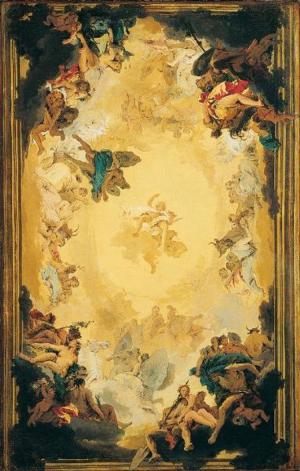Phases of an Inferior Planet
Nonfiction, Religion & Spirituality, New Age, History, Fiction & Literature| Author: | Ellen Anderson Gholson Glasgow | ISBN: | 9781465626301 |
| Publisher: | Library of Alexandria | Publication: | March 8, 2015 |
| Imprint: | Language: | English |
| Author: | Ellen Anderson Gholson Glasgow |
| ISBN: | 9781465626301 |
| Publisher: | Library of Alexandria |
| Publication: | March 8, 2015 |
| Imprint: | |
| Language: | English |
Along Broadway at six o'clock a throng of pedestrians was stepping northward. A grayish day was settling into a gray evening, and a negative lack of color and elasticity had matured into a positive condition of atmospheric flatness. The air exhaled a limp and insipid moisture, like that given forth by a sponge newly steeped in an anæsthetic. Upon the sombre fretwork of leafless trees, bare against red-brick buildings, drops of water hung trembling, though as yet there had been no rainfall, and the straggling tufts of grass in the city parks drooped earthward like the damp and uncurled fringe of a woman's hair. Spanning the remote west as a rainbow stretched an unfulfilled pledge of better things, for beyond the smoke-begrimed battalion of tenement chimney-pots a faint streak of mauve defined the line of the horizon—an ineffectual and transparent sheet of rose-tinted vapor, through which the indomitable neutrality of background was revealed. The city swam in a sea of mist, and the electric lights, coming slowly into being, must have seemed to a far-off observer a galaxy of wandering stars that had burst the woof of heaven and fallen from their allotted spheres to be caught like blossoms in the white obscurity of fog. Above them their deserted habitation frowned blackly down with closed doors and impenetrable walls. The effect of the immortal transformation of day into night was singularly elusive. It had come so stealthily that the fleet-footed hours seemed to have tripped one another in the fever of the race, the monotonous grayness of their garments shrouding, as they fluttered past, the form of each sprightly elf. Along Broadway the throng moved hurriedly. At a distance indescribably homogeneous, as it passed the lighted windows of shops it was seen to be composed of individual atoms, and their outlines were relieved against the garish interiors like a panorama of automatic silhouettes. Then, as they neared a crossing, a flood of radiant electricity, revealing minute details of face and figure, the atoms were revivified from automatic into animal existence. With an inhuman disregard of caste and custom, the aberrant shadows of the passers-by met and mingled one into another. A phantasmagoric procession took place upon the sidewalk. The ethereal accompaniment of the physical substance of a Wall Street plutocrat glided sedately after that of a bedizened daughter of the people, whose way, beginning in the glare of the workhouse, was ending in the dusk of the river; a lady of quality, whose very shadow seemed pregnant with the odor of spice and sables, melted before the encroaching presence of a boot-black fresh from the Bowery; a gentleman of fashion gave place to the dull phantom of a woman with burning brows and fingers purple with the stain of many stitches. It was as if each material substance, warm with the lust of the flesh and reeking with a burnt-offering of vanity, was pursued by the inevitable presence of a tragic destiny.
Along Broadway at six o'clock a throng of pedestrians was stepping northward. A grayish day was settling into a gray evening, and a negative lack of color and elasticity had matured into a positive condition of atmospheric flatness. The air exhaled a limp and insipid moisture, like that given forth by a sponge newly steeped in an anæsthetic. Upon the sombre fretwork of leafless trees, bare against red-brick buildings, drops of water hung trembling, though as yet there had been no rainfall, and the straggling tufts of grass in the city parks drooped earthward like the damp and uncurled fringe of a woman's hair. Spanning the remote west as a rainbow stretched an unfulfilled pledge of better things, for beyond the smoke-begrimed battalion of tenement chimney-pots a faint streak of mauve defined the line of the horizon—an ineffectual and transparent sheet of rose-tinted vapor, through which the indomitable neutrality of background was revealed. The city swam in a sea of mist, and the electric lights, coming slowly into being, must have seemed to a far-off observer a galaxy of wandering stars that had burst the woof of heaven and fallen from their allotted spheres to be caught like blossoms in the white obscurity of fog. Above them their deserted habitation frowned blackly down with closed doors and impenetrable walls. The effect of the immortal transformation of day into night was singularly elusive. It had come so stealthily that the fleet-footed hours seemed to have tripped one another in the fever of the race, the monotonous grayness of their garments shrouding, as they fluttered past, the form of each sprightly elf. Along Broadway the throng moved hurriedly. At a distance indescribably homogeneous, as it passed the lighted windows of shops it was seen to be composed of individual atoms, and their outlines were relieved against the garish interiors like a panorama of automatic silhouettes. Then, as they neared a crossing, a flood of radiant electricity, revealing minute details of face and figure, the atoms were revivified from automatic into animal existence. With an inhuman disregard of caste and custom, the aberrant shadows of the passers-by met and mingled one into another. A phantasmagoric procession took place upon the sidewalk. The ethereal accompaniment of the physical substance of a Wall Street plutocrat glided sedately after that of a bedizened daughter of the people, whose way, beginning in the glare of the workhouse, was ending in the dusk of the river; a lady of quality, whose very shadow seemed pregnant with the odor of spice and sables, melted before the encroaching presence of a boot-black fresh from the Bowery; a gentleman of fashion gave place to the dull phantom of a woman with burning brows and fingers purple with the stain of many stitches. It was as if each material substance, warm with the lust of the flesh and reeking with a burnt-offering of vanity, was pursued by the inevitable presence of a tragic destiny.















